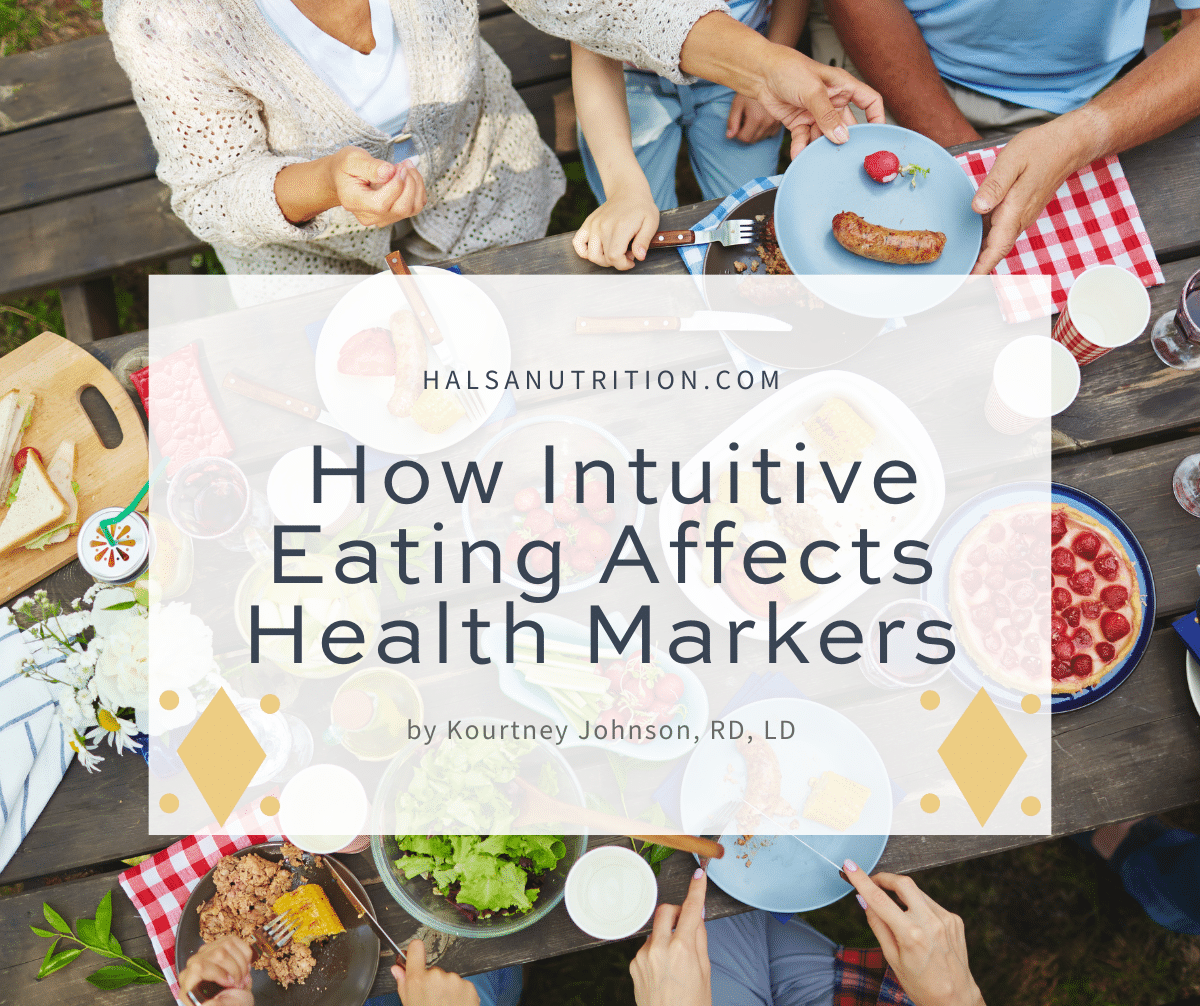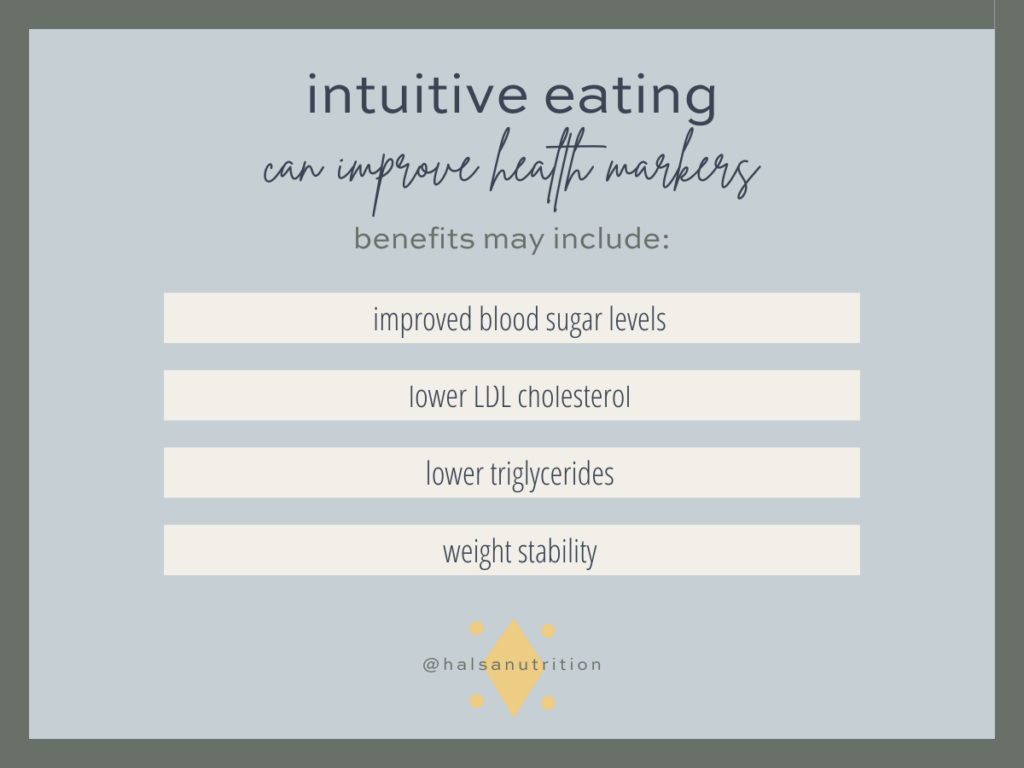
How Intuitive Eating Affects Health Markers
by Kourtney Johnson, RD, LD
Estimated reading time: 5 minutes
A commonly asked question about Intuitive Eating (IE) is if it’s healthy when you have a chronic disease. Because there’s a common misconception that this framework is just eating whatever, whenever, it’s easy to understand how you can get confused. However, studies have shown that IE does benefit a variety of health markers, impacting the risk of developing health conditions.
What are health markers?
Also called biomarkers, these are measures used in a health assessment to track and predict your state of health. Examples of these markers are blood pressure, cholesterol levels, and blood sugar.
Intuitive Eating is associated with improvements in various health markers because of outcomes like lower stress levels, increased energy, and better mental health. When you no longer worry about following strict food rules and meet your body’s unique nutrition needs instead, your overall health will benefit!
The impact of IE on blood sugars
One study looked at adults with type 2 diabetes and found that the participants with the highest scores on the Intuitive Eating Scale, which indicates they practice Intuitive Eating, had an 89% less chance of having poor blood sugar control. Another study focused on teens with type 1 diabetes. Participants with higher scores on the Intuitive Eating Scale and Eating for Physical Rather than Emotional Reasons subscale were likely to have a lower HbA1c (average blood sugar over the past three months) by 22% and 11%, respectively.

Health markers associated with heart disease
Research that examined older adults age 59 or older found that Intuitive Eating is associated with lower levels of certain health markers related to heart disease. Specifically, the studies found lower levels of LDL (bad cholesterol) and triglycerides, which suggests Intuitive Eating can decrease the risk of cardiovascular disease in older adults.
Intuitive Eating and weight stability
While IE is a weight-neutral framework, meaning there isn’t a focus on the number on the scale, it’s associated with weight stability. A study that followed participants for two years found that those who lost or gained 10% or more of their weight had a higher risk of hospitalization and health problems compared to people whose weight was stable. In particular, people who lost weight had higher rates of conditions like diabetes, stroke, and cancer.
Nutrition isn’t the only factor of health
There’s no doubt that nutrition plays an important role in health, but it’s not the only factor. Instead, it’s best to focus on the big picture, which involves the social determinants of health. The social determinants of health include 4
- economic stability
- access to and quality of education
- healthcare quality and access
- neighborhood and built environment
- social and community context
In addition to the social determinants of health, other traits like gender, age, and genetics are out of our control. These characteristics can increase the likelihood of developing health conditions or having less-than-perfect health markers. Keep this in perspective as your health journey unfolds, because as much as we’d love to be able to control all the factors that go into health, it’s just not possible.

However, knowing that there are other elements of health besides nutrition doesn’t mean Intuitive Eating can’t still play a large role in improving mental and physical health. Healing your relationship with food, finding movement you enjoy, and letting go of the stress and anxiety associated with poor body image are major benefits of IE, but most people don’t know how to start the process.
That’s where a registered dietitian like Maria comes in! She is trained in Intuitive Eating and is able to successfully help her clients move through the framework so they can enjoy life without missing out on social activities or being preoccupied with anxiety about what others are thinking of their food choices or body size.
Next steps
If you are interested in learning more about what it might look like to work with Maria, click here to schedule a free call! You’ll be able to ask questions, chat about your goals, and figure out which nutrition approach is best for you in order to decide if you and Maria would work well together!
Other Posts You May Like
- The Connection Between Intuitive Eating and Diabetes
- The 10 Principles of Intuitive Eating Help You to be Kind to Your Body
- What Started the Intuitive Eating Movement?
- Health Benefits of Intuitive Eating
About the Author
Kourtney is a registered dietitian who is passionate about sharing information related to intuitive eating and the harms of diet culture. She is from Minnesota but now lives in Spain, where she enjoys trying new foods and learning more about the culture there! In her free time, she likes to read, go to the beach, spend time with friends and family, and travel.
This article was edited and reviewed by Maria Adams, MS, MPH, RDN, LDN, a registered dietitian and Certified Intuitive Eating Counselor. Maria takes a weight-inclusive approach and helps individuals rediscover the joy of food by helping them heal from chronic dieting and disordered eating. She holds a Bachelor of Science Degree in Nutrition Science, a Master of Science in Nutrition Communication, and a Master of Public Health.
Leave a Reply